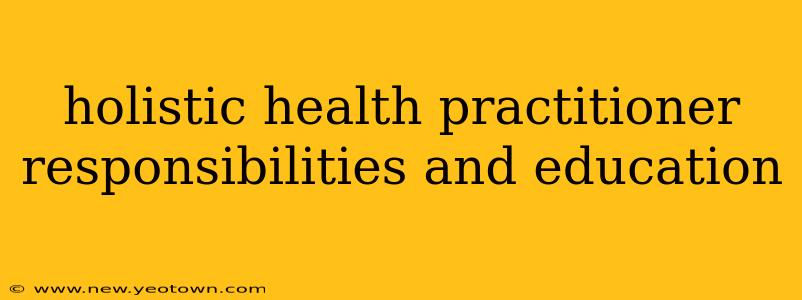The path of a holistic health practitioner is a rewarding one, filled with the satisfaction of guiding individuals toward optimal well-being. But what exactly does this career entail? It's more than just offering herbal remedies; it's about understanding the intricate connection between mind, body, and spirit. This journey begins with a deep dive into education, followed by a commitment to a broad range of responsibilities.
What Does a Holistic Health Practitioner Do?
Imagine a detective meticulously piecing together clues to solve a complex case. That's similar to what a holistic health practitioner does. They don't just treat symptoms; they delve into the root cause of an individual's health concerns. This holistic approach considers various factors influencing a person's health, including:
- Physical factors: Diet, exercise, sleep, and environmental influences.
- Emotional factors: Stress levels, relationships, and mental health.
- Spiritual factors: Purpose, beliefs, and connection to something larger than oneself.
This integrated approach allows practitioners to create personalized wellness plans. Let's explore some key responsibilities:
1. Conducting Comprehensive Health Assessments:
A holistic health practitioner's first step involves a thorough assessment. This goes beyond standard medical history; it includes detailed discussions about lifestyle, diet, stress levels, emotional well-being, and spiritual practices. They might use techniques like:
- Nutritional assessments: Analyzing dietary habits to identify deficiencies or imbalances.
- Lifestyle assessments: Evaluating sleep patterns, exercise routines, and stress management strategies.
- Emotional assessments: Identifying emotional blocks or patterns that may be contributing to health problems.
The goal is to gain a deep understanding of the individual's unique needs and create a tailored approach.
2. Developing Personalized Wellness Plans:
Based on the assessment, practitioners craft personalized plans. This may involve a combination of:
- Dietary recommendations: Tailored meal plans and nutritional guidance.
- Lifestyle changes: Suggestions for improving sleep, incorporating exercise, and managing stress.
- Mind-body techniques: Meditation, yoga, or other practices to promote relaxation and emotional balance.
- Supplements: In some cases, recommending nutritional supplements to address deficiencies.
- Referral to other healthcare professionals: When necessary, connecting clients with other specialists like doctors, psychologists, or physical therapists.
3. Providing Education and Support:
The role extends beyond simply creating a plan; it involves educating and empowering clients to take an active role in their health journey. This includes:
- Explaining the rationale behind recommendations: Ensuring clients understand why specific changes are being made.
- Providing ongoing support and guidance: Regularly checking in with clients to offer encouragement and adjust the plan as needed.
- Empowering self-care: Helping clients develop tools and strategies for self-management.
Building a strong therapeutic relationship is crucial to foster trust and collaboration.
What Education is Required to Become a Holistic Health Practitioner?
The educational pathway varies depending on the specific area of focus within holistic health. There's no single, universally recognized certification. However, common educational routes include:
1. Formal Degree Programs:
Some institutions offer bachelor's or master's degrees in holistic health, integrative medicine, or related fields. These programs provide a strong foundation in various holistic health modalities.
2. Certification Programs:
Many organizations offer certification in specific areas, such as nutrition, herbalism, or massage therapy. These programs often focus on practical skills and knowledge.
3. Continuing Education:
The field is constantly evolving, requiring ongoing professional development. Holistic health practitioners often participate in workshops, conferences, and other learning opportunities to stay updated on the latest research and techniques.
Frequently Asked Questions (FAQs)
What are the different types of holistic health practitioners?
The field encompasses numerous specialties, including naturopathic doctors, herbalists, nutritionists, massage therapists, acupuncturists, and yoga instructors. Each area has its unique focus and educational requirements.
How much do holistic health practitioners earn?
Earnings vary greatly depending on location, experience, specialization, and business model. Some practitioners are employed by clinics or hospitals, while others operate their own practices.
Is there a licensing requirement for holistic health practitioners?
Licensing requirements vary significantly by state and specialization. Some areas, like naturopathic medicine, have strict licensing regulations, while others have less formal requirements. Always check your state’s requirements.
How can I find a qualified holistic health practitioner?
Research and referrals are key. Look for practitioners with relevant certifications, experience, and positive client testimonials. Check with your primary care physician for recommendations.
The journey of a holistic health practitioner is a blend of rigorous education and compassionate practice. It's a calling to empower individuals to take charge of their health and well-being. By understanding the responsibilities and educational pathways, you can better appreciate the crucial role these professionals play in promoting a healthier world.

